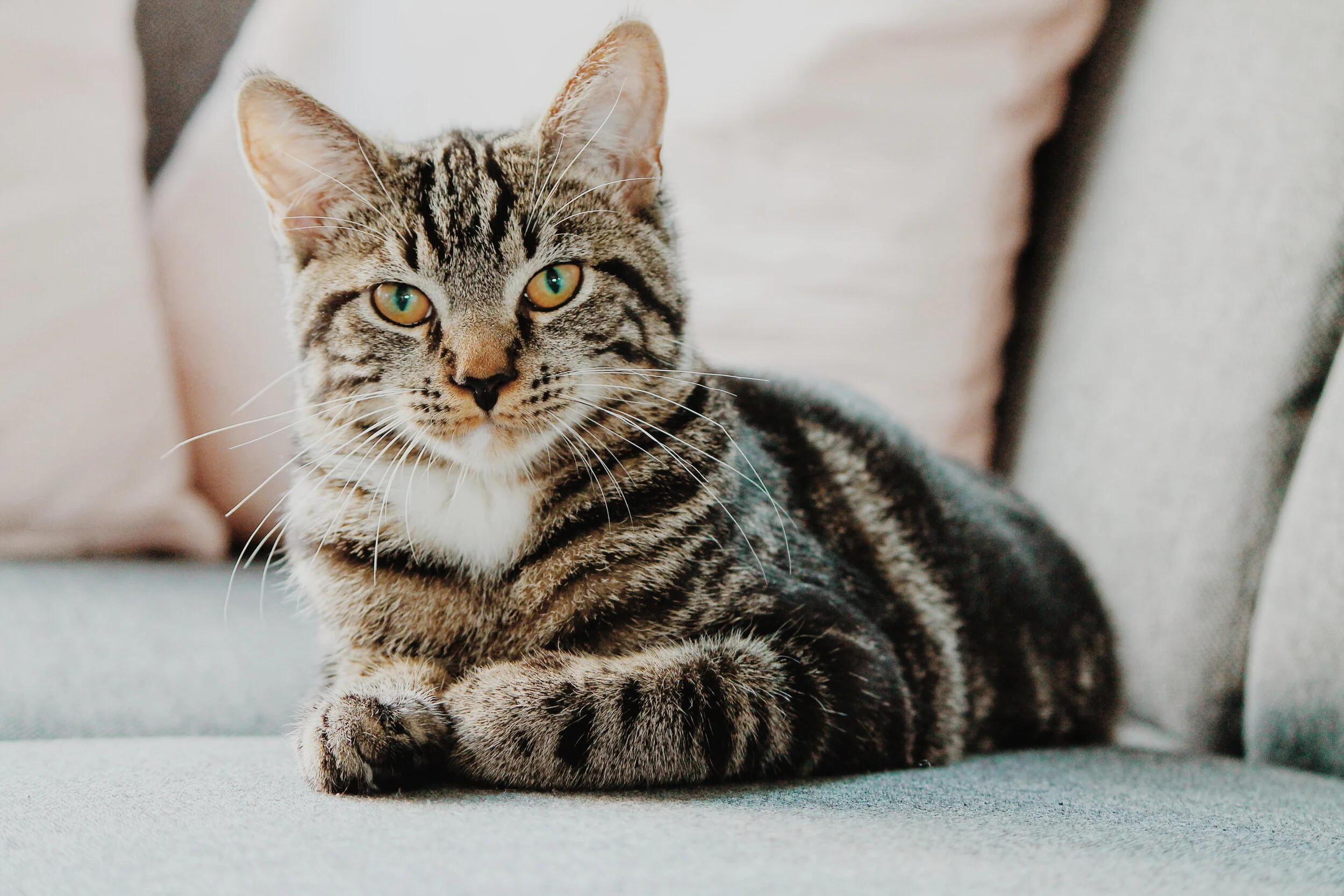All you need to know about neutering your cat
First things first: neuter… spay… castrate? What’s the right term for stopping your cat - male or female - producing kittens? The word “spay” refers to the sterilization of female pets. The term “neuter” is more commonly used to refer to the castration of male pets. In female cats, the uterus and ovaries are removed through a small incision in the abdominal wall. In male cats, the testicles are removed (not the scrotum).
WHY SHOULD I SPAY OR NEUTER MY PET?
Spay/neuter has a huge impact on pet overpopulation. Millions of cats worldwide are euthanised annually or are strays. This is the tragic result of unwanted, unplanned litters that could have been prevented by spaying or neutering. In addition:
Your spayed female won’t go into heat.
Unneutered cats mark their territory by spraying strong-smelling urine.
Your pet will live a longer, healthier life.
Spaying a female helps prevent pyometra (infected uterus).
Spaying a female helps prevent breast cancer, which is often fatal.
Neutering a male prevents testicular cancer and prostate diseases.
Your pet will be much better behaved.
IS SPAY/NEUTER SURGERY PAINFUL? CAN IT HARM MY CAT
During spay or neuter surgery, cats and dogs are fully anesthetized, so they feel no pain. Afterward, signs of discomfort disappear within a few days, and with pain management medication, pain may not be experienced at all. Serious harm as a result of spay/neuter surgery is extremely rare.
WILL MY PET’S BEHAVIOR CHANGE AFTER SPAY/NEUTER SURGERY?
Spay/neuter will not alter your pet’s basic personality. It can result in some behaviour changes – for the better! Pets may be less aggressive, more relaxed, and more focused on you. Freed from the urge to mate, cats tend to be calmer and more content after spaying or neutering. Spayed or neutered pets are more, not less, likely to show affection toward their human companions.
WILL MY PET BECOME FAT AFTER SPAY/NEUTER?
Just like people, pets become overweight when they eat too much and/or exercise too little. An appropriate diet and sufficient activity will keep your cat slender and healthy.
WILL NEUTERING PREVENT MY CAT FROM SPRAYING?
Urine marking is most common in unneutered males. Unneutered males usually start spraying or “marking their territory” when they reach sexual maturity (about 6 months). Male cats in multi-cat households or in close proximity to other cats may spray at a younger age. It’s best to neuter males before they reach sexual maturity and before they start spraying. If a cat has started spraying neutering may help. It takes about 6-8 weeks for the hormones to subside after the neutering so you may not notice an immediate difference.
HOW OLD DOES MY CAT HAVE TO BE FOR SPAY/NEUTER SURGERY?
Cats must be weigh at least two pounds.
DOES MY CAT HAVE TO BE VACCINATED PRIOR TO BEING SPAYED?
For your pet’s protection, we recommend cats have their FVRCP.
DOES DAHAB CATS SPAY/NEUTER FERAL CATS?
Yes.
Please read more about our ongoing programme.
DO YOU MICROCHIP DURING SURGERY?
Yes, if requested we will implant a microchip at the time of surgery. There is a fee to do this.
SHOULD FEMALE CATS BE SPAYED PRIOR TO THEIR FIRST HEAT CYCLE?
Yes, to greatly reduce the chance of mammary cancer. Risk of mammary neoplasia (tumors) decreases dramatically if a cat is spayed before their first heat cycle.
Spaying before a cat’s first heat cycle can decrease their risk to 0.6%, and given that 85% of mammary tumors in cats are malignant, early spaying is immensely beneficial!
WHEN DO CATS FIRST GO INTO HEAT?
Cats normally go into heat around six months of age but it can be as early as five months of age.
WHAT ARE THE SIGNS MY CAT IS IN HEAT?
Your cat will be more affectionate. When you’re petting her, she may raise her hind end in the air, get low to the ground, and purr like crazy. She will begin calling. This yowling can go on around the clock. She will lift her tail and spray urine on vertical objects, like walls, doors, and furniture rather than on the floor or carpet. She may have a small amount of vaginal discharge, which will appear bloody. And, she will also try and run outside any chance she gets to find a mate!
HOW LONG DO HEAT CYCLES LAST IN CATS?
Heat cycles usually last around 7 days.
HOW OFTEN DO CATS GO INTO HEAT?
The heat cycle will repeat every 2-3 weeks and a cat can go back into heat one week to one month after delivering kittens.
CAN A CAT BE SPAYED DURING THE HEAT CYCLE?
Though spaying a cat in heat is not ideal, it can be done. However, there are some disadvantages to this as the surgery is more complicated and takes longer; there is also likely to be an extra charge.
When a cat is in heat, the blood vessels that supply the reproductive organs and surrounding tissues become engorged with blood and so the tissues may be more prone to tearing. The increased risks to the cat are minor but some vets prefer not to operate while a cat is in heat. Please seek advice when making your appointment.
IS IT HEALTHIER FOR MY PET TO HAVE ONE LITTER BEFORE BEING SPAYED?
No, females spayed prior to their first heat cycle are at less risk for breast tumors.
SHOULD I LET MY PET HAVE A LITTER SO MY CHILDREN CAN WITNESS THE MIRACLE OF BIRTH?
We do not recommend this. Letting your pet produce offspring you have no intention of keeping teaches your children irresponsibility. Anyone who has seen an animal euthanised in a shelter for lack of a home knows the truth behind this dangerous myth.
CAN A CAT BE SPAYED IF IT IS PREGNANT?
Yes. The sooner you can bring them in, the better. There may be an extra charge.
CAN CATS BECOME PREGNANT DURING THEIR HEAT CYCLE?
Yes.
CAN CATS BECOME PREGNANT BY THEIR SIBLINGS?
Yes, they can create their own litters. You don’t want that to happen.
HOW LONG DOES PREGNANCY LAST IN CATS?
It’s usually 64 days.
HOW LONG AFTER DELIVERING KITTENS CAN A CAT BE SPAYED?
Wait 8 weeks after delivery to spay the mom. Kittens should be 8 weeks of age and must be eating and drinking on their own prior to their mother’s surgery.
CAN CATS HAVE FOOD OR WATER THE NIGHT BEFORE SURGERY?
Adult Cats: cats over four months of age must have food withdrawn the night before surgery at 12:00 midnight. This will ensure that their stomach has emptied by the time they go under general anesthesia. This lessens the chances that your cat will vomit and aspirate the vomit into their lungs. If your pet has eaten on the morning of surgery, your vet may refuse to do the surgery. Do not withhold water prior to surgery – rather, allow them free access to water up until the time you bring them into the clinic.
Pediatric Cats: cats four months or younger should have food available until admission time on the morning of surgery to avoid decreased blood sugar level. Do not withhold water prior to surgery.
DOES YOUR VET PERFORM AN EXAM ON MY CAT BEFORE SURGERY?
Our veterinarians perform a pre-operative physical examination to make sure that your pet is a good candidate for surgery. If your pet is too fractious to handle, a physical exam will be performed under anesthesia. Feral cats get their exam under anesthesia. If your pet is showing signs of illness or if there are any concerns (such as a heart murmur, severe upper respiratory infection, obesity) the vet may refuse surgery if we feel surgery is a health risk.
DOES YOUR VET USE ANESTHESIA?
Yes. The comfort and safety of each animal is important to us. All cats are anesthetized with safe anesthetic agents. They receive anesthetic monitoring via pulse oximetry, which measures heart rate and oxygen levels.
DOES YOUR VET USE PAIN MEDICATION?
All patients receive pain medication before and after surgery.
WHAT IS THE RECOVERY PERIOD?
The recovery period is 24 hours – 3 days. If you are able to restrict your pet’s activity and keep him/her indoors then do so. If the cat is feral, the recovery period will depend upon the operation and the vet will advise. A male can usually be let out after it has completely woken up from the anaesthetic and a female after 24 hours

